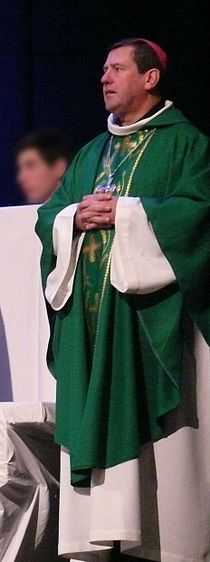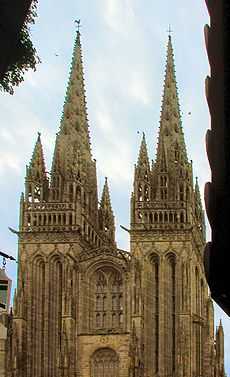Roman Catholic Diocese of Quimper
| Diocese of Quimper and Léon Dioecesis Corisopitensis-Leonensis Diocèse de Quimper et Léon | |
|---|---|
|
| |
| Location | |
| Country | France |
| Ecclesiastical province | Rennes |
| Metropolitan | Archdiocese of Rennes |
| Statistics | |
| Area | 6,785 km2 (2,620 sq mi) |
| Population - Total - Catholics |
(as of 2010) 885,900 722,000 (81.5%) |
| Information | |
| Denomination | Roman Catholic |
| Rite | Roman Rite |
| Established |
5th Century as Diocese of Quimper 23 November 1853 (As Diocese of Quimper-Léon) |
| Cathedral | Cathedral Basilica of St Corentin in Quimper |
| Patron saint | St Corentin of Quimper |
| Current leadership | |
| Pope | Francis |
| Bishop | Jean-Marie Le Vert |
| Metropolitan Archbishop | Pierre d'Ornellas |
| Website | |
| Website of the Diocese | |
The Roman Catholic Diocese of Quimper (Lat:Dioecesis Corisopitensis), is a diocese of the Latin Rite of the Roman Catholic church in France. In 1853, the name was changed to the Diocese of Quimper, Cornouailles.[1]
Originally established in the 5th century, the diocese was restored by the Concordat of 1801, as the combination of the dioceses of Quimper, Saint-Pol-de-Léon and Tréguier in Brittany, France. Traditionally, it formed part of Lower Brittany. It now covers an area of 7,029 km². (2,714 square miles), and contains a population of 852,685 - 750,000 (88%) of which are Catholic.
The diocese is a suffragan of the Archdiocese of Rennes. The current bishop is Jean-Marie Le Vert.[1]
History
Diocese of Quimper
There are two versions of the catalogue of the bishops of Quimper: one in the Cartulary of Quimperlé, of the twelfth century; the other preserved in a Quimper cartulary of the fifteenth century. Both mention a St Corentinus as first Bishop of Quimper; his biography is of very late origin. Nothing accurate is known about him, but he is supposed by some to have been ordained by St. Martin in the fourth century, while others claim that he was a 6th-century monk. The Diocese of Quimper was represented at church councils as early as the mid-fifth century.[2]
Diocese of Saint-Pol-de-Léon
Christianity seems to have been preached in Léon twenty years before the evangelization of Cornouaille, but ancient Breton chronology is very uncertain. The legend of St. Paul Aurelian, written in 884, shows that the Breton monks believed the See of Léon had been founded in the Merovingian epoch. The hermit Saint Ronan, a native of Ireland, often held to be one of the 350 bishops consecrated by Saint Patrick, was in the fifth century one of the apostles of Cornouailles and the neighbourhood around Léon. Paul Aurelian, a Gallic monk, founder of monasteries at Ouessant on the north-west coast of Brittany and on the Island of Batz, was believed to have founded in an abandoned fort a monastery which gave origin to the town of St. Pol de Léon, afterwards the seat of a diocese. He was the first titular of the see, a wonder-worker and prophet, and was held to have died in 575 at the age of 140 years, after having been assisted in his labours by three successive coadjutors. Though the monastery of Léon was probably founded by Paul Aurelian in the sixth century, the history of the diocese is more complicated. It is at least certain that there are traces in history of a Diocese of Léon as far back as the middle of the ninth century.[2]
The cornerstone of Quimper Cathedral was laid in 1424, but the building was still unfinished at the beginning of the sixteenth century. When Alexander VI granted that church the same indulgences as could be gained at the Roman Jubilee, funds came in which allowed its completion. The Cathedral of St. Pol de Léon was built between the 13th and 16th centuries. The church of Notre Dame de Creisker, in the same town, restored in the fourteenth century, has a belfry which the Bretons claim to be the handsomest in the world. Formerly Quimperlé had an important Benedictine abbey, Sainte Croix, founded in 1029, and where the Benedictines of St. Maur took up their residence in 1665. It was suppressed by the Revolution. Brest, one of the great fortified harbours of France, is in the diocese.
In 1608 Counter-Reformation preacher Michel Le Nobletz conducted his first mission on the island of Ouessant. "Apostle of Brittany" Father Julian Maunoir worked as a missionary to the Breton people for 43 years. Albert Le Grand wrote the "Lives of the Saints of Brittany" (1636) and published a Breton dictionary, and some devotional works in Breton. Today he is considered by some to be the founder of Breton philology.
Jean François de La Marche, Bishop of St. Pol de Léon from 1772, took refuge in England in 1792, and organized material assistance for the émigré clergy, as well as spiritual comfort for the French prisoners detained in England. He obtained a grant of the Castle of Winchester for the émigré French priests, and gathered there no less than eight hundred of them. He died in 1806.[2]
Other notable secular members of the diocese are the classical scholar Jean Hardouin (1646–1729) and the critic Élie Catherine Fréron (1719–71).
List of bishops, 1802 to present

- Claude André (April 9, 1802 – 1804)
- Pierre-Vincent Dombideau de Crouseilhes (January 30, 1805 - June 29, 1823)
- Jean-Marie-Dominique de Poulpiquet de Brescanvel (September 12, 1823 - May 1, 1840)
- Jean-Marie Graveran (May 26, 1840 - February 1, 1855)
- Nicolas-Marie Sergent (February 6, 1855 - July 26, 1871)
- Charles-Marie-Denis-Anselme Nouvel de La Flèche (October 16, 1871 - June 1, 1887)
- Jacques-Théodore Lamarche (November 8, 1887 - June 15, 1892)
- Henri-Victor Valleau (November 26, 1892 - December 24, 1898)
- François-Virgile Dubillard (December 7, 1899 - December 16, 1907)
- Adolphe-Yves-Marie Duparc (February 11, 1908 - May 8, 1946)
- André-Pierre-François Fauvel (April 24, 1947 - February 28, 1968)
- Francis Jules Joseph Marie Barbu (February 28, 1968 - May 3, 1989)
- Clément Joseph Marie Raymond Guillon, (May 3, 1989 - July 9, 2010)
- Jean Marie Le Vert, (Dec 7, 2007 - January 22, 2015)
Sede vacante since 22nd January 2015, when Pope Francis accepted the resignation from the pastoral care of the diocese of Quimper, France, presented by Bishop Jean-Marie Le Vert, in accordance with canon 401 para. 2 of the Code of Canon Law
Notes
References
External links
- Extensive information
- (French) Home page
